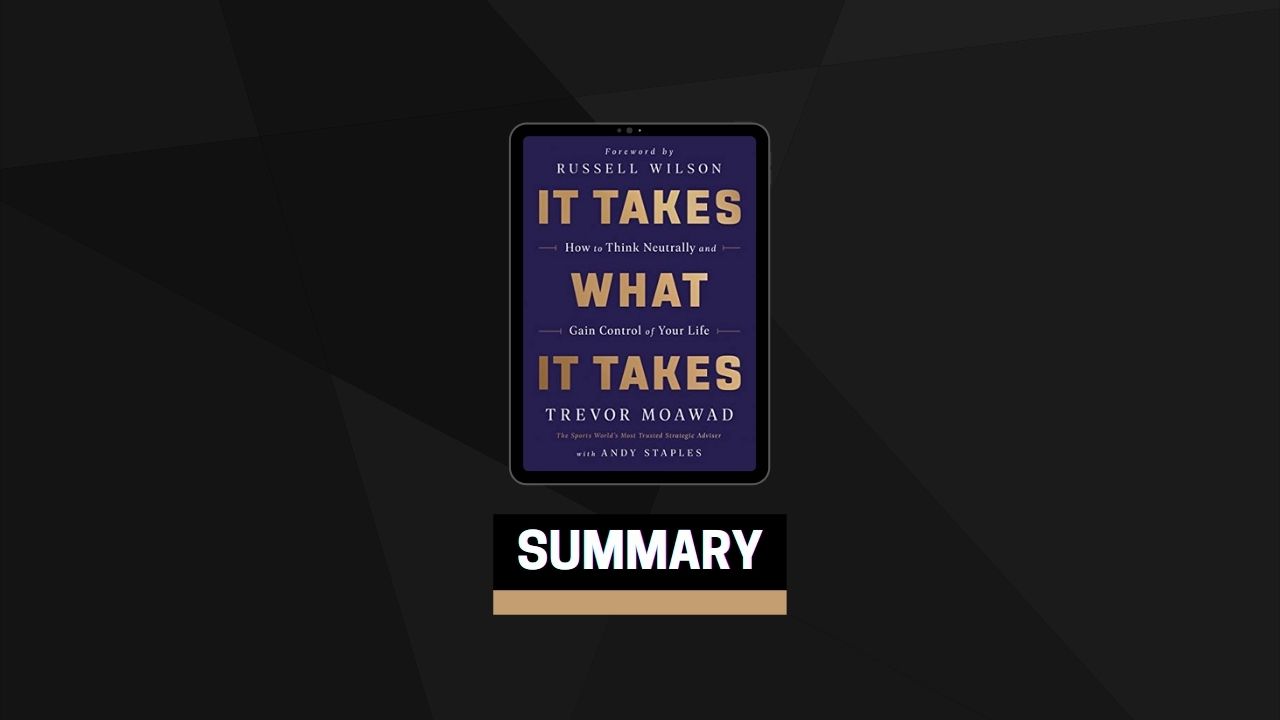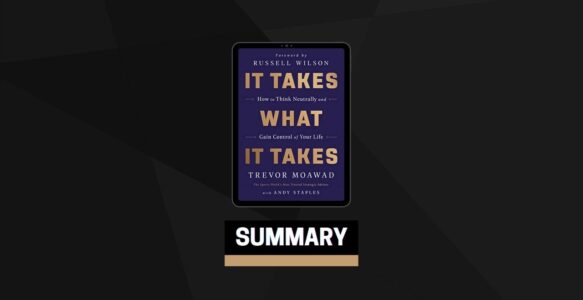It Takes Neutral Thinking
Negative, cynical thinking doesn’t make you more realistic. It just makes you negative and cynical. Biased thinking doesn’t help you either. You need to steer clear of your feelings and make an honest assessment of each situation you face. Don’t worry about what you feel. Rely on what you know.
This translates to any workplace. You may despise your boss. But are you going to half-ass an assignment out of spite for the boss? If you do, you might hurt only yourself. Instead, try to look at the assignment neutrally. If you complete the task, you will be successfully doing your job. And if you continuously complete your tasks, the boss will get off your back. You may even get promoted and become his boss. This happens when the truth guides us. When judgment diminishes. We recognize that the present determines the present, and today’s behavior is what influences tomorrow’s outcomes. Start now.
It Takes a Plan
Russell Wilson takes a plan to achieve anything of value. When you plan, you identify an end goal and then chart out neutral behaviors that can help you reach that goal. That may sound overly simplistic, but a lot of people say “I want to do this” without thinking about the behaviors and benchmarks required to reach that goal. Choosing not to plan is actually a plan around not planning.
You wouldn’t drive to a place you’ve never been without first checking a map or plugging the address into Waze or Google, would you? And what is a set of directions if not a plan? For any big project you take on, you need to map out your route. You need to make a plan. For something huge like the Super Bowl, Russell made multiple plans.
It Takes Hard Choices
No matter what situation you find yourself in, there is almost always a behavior you can easily identify that, if you eliminate it, will set you on a better path. The first step to getting out of a hole is to stop digging. Sometimes it’s easier to not do something than it is to do something. Stop verbalizing dumb-ass things about your inability to present in front of a group. Stop eating white bread. Stop drinking sugary drinks. Stop watching the news if it makes you mad. Stop saying I can’t or I won’t or it’s impossible. You want something? It starts with one choice.
It Takes a Verbal Governor
The human mind absorbs negativity seven times more easily than it absorbs positivity. We also know that language is the most powerful carrier of negativity. Ever wonder why people seem to remember all the bad things you said about them and none of the good things? We’re hardwired that way. It’s an evolutionary trait.
But the world has changed. The odds of you walking off an unseen cliff or getting eaten by a bear have dropped considerably. We are relatively safe compared to our long-ago ancestors, so this survival instinct that served them so well serves only to make us miserable much of the time.
If we want to find what that next level is, then the language and the behaviors have to line up with who you want to be, with the outcome you desire. Period.
It Takes a Negativity Diet
Negativity, in any form that we choose to bring into our lives, is poison. There is negativity outside of our lives that we can’t stop and can’t stay away from. But we can choose what we bring into our lives. Don’t choose the things that will weaponize us against ourselves. Stay away from cable news channels. Stay away from radio shows and podcasts designed to inflame and anger. Nothing personal against Sam Hunt, but stay away from sad country songs.
Life is hard enough even when we don’t choose to bombard our senses with negativity. When we do, everything can feel hopeless. So watch shows that make you laugh or cheer. Consume news that deals in facts, not opinions. Listen to songs that lift you up instead of dragging you down.
It Takes an Ad Campaign in Your Brain
A world-class sports team can create buy-in and belief only by marketing a powerful vision to the players, coaches, and staffers it employs. The ability to sell to others is incredibly valuable, but it isn’t as valuable as the ability to sell to yourself.
No one knows exactly how many thoughts you have a day. The estimates range anywhere from 60,000 to 120,000. Whatever it actually is, it’s a lot. Your brain is constantly evaluating situations. The key is to learn to control those thoughts in order to advertise to yourself. Because you are the most powerful advertiser.
It Takes Visualizing
Imagery is a mental technique. It’s a core element of any mental conditioning program—just as squats are a core element of any physical conditioning program. Structured imagery programs the mind and the body to respond optimally by recreating or creating information using all the senses—sight, touch, hearing, taste, smell.
Your brain strengthens your muscle memory by teaching the fibers in your muscles how to move as if you were actually performing what you imagine. So when you see that lemon entering your mouth, your taste buds respond and learn as if they were actually tasting. This is real. We all do this. We all can do it better. The best do it strategically.
Your mind matters. You exert incredible influence on what you think. What you see. We don’t have to accept life the way it comes to us. We can design it in advance so we can get the life we seek.
It Takes Self-Awareness
Fred Taylor mastered his own process. It started by recognizing what wasn’t working. We had to figure out why he wasn’t staying healthy. It becomes a real weapon in your fight to know both what you need and how to find the people who can help you get it. When we choose dumb-ass behaviors, we choose failure. If we don’t know our behaviors are dumb-ass, then we also make the choice not to know. You might think that the standard of performing in front of millions of people would drive quick alignment. But it’s our own standards and behaviors that truly drive our process. We all have a set of behaviors that will make us successful.
Knowing yourself can guide you in forming the behaviors that will help you meet your goals. Whether you’re unconsciously incompetent, consciously incompetent, or unconsciously competent, learning about yourself and adjusting your behaviors can make you consciously competent in every aspect of your life. That won’t make you as fast as Fred Taylor, but it’ll make you a happier, more productive employee, spouse, parent, or whatever you dream of becoming.
It Takes Pressure
Greatness is available to anyone—including your opponents—and the pressure is on you to snatch it first. This is true on the field, on the court, or in your office. You may be intimidated by that pressure you feel to perform every day. Instead, try embracing it. Pressure isn’t a burden. It isn’t something to be avoided or minimized. As tennis great Billie Jean King said, pressure is a privilege. What does that mean? If you’re under pressure, it means someone gives a shit what you do. If you’re under pressure, it means someone relies on you. That is the ultimate privilege.
The key is responding properly to that pressure. Because those who perform under the greatest pressure capture the greatest victories. That’s why you should run toward pressure instead of away from it.
It Takes Leadership
anyone who chooses a path toward greatness is going to have to stare this concept down and see where they stand in relation to it. Even if you aren’t a manager, you have to lead yourself. (And if you lead yourself well, you may get promoted and wind up leading others.) If you’re a parent, you have to lead your children. Everyone needs to know how to lead, and everyone needs to know how to recognize effective and ineffective leaders and understand why those people succeed or fail.
It Takes Role Models
Attitude is contagious. The right attitudes can be particularly contagious. The best teams, organizations, units, and even countries are led by people who have this ability to influence. To inspire. These are people we can’t help but want to emulate.
The most powerful role models aren’t usually the ones we watch in stadiums full of screaming fans. They aren’t movie stars. They aren’t CEOs. They are people we see every day. Russell wanted to be like Derek Jeter, but the man he most wanted to emulate was his dad.
The best role models can make other people believe more deeply in themselves. In the mission. In the process. In the vision.
It Takes What It Takes
Most elite athletes choose not to compromise. Most of them never have been and never will be complacent. They always want more. They always want to get better. That’s such a powerful starting point. Wanting leads to questions. Those questions make us look at the role choice plays in our life relative to the things we want. That pushes us to make a plan. From there the barriers become clear, and the solutions quickly follow. When our mind sees solutions, we begin to adopt the best behaviors. We can approach life neutrally and do what we must do to produce the outcomes we desire. Once we reach this point, we know.
It takes what it takes.


